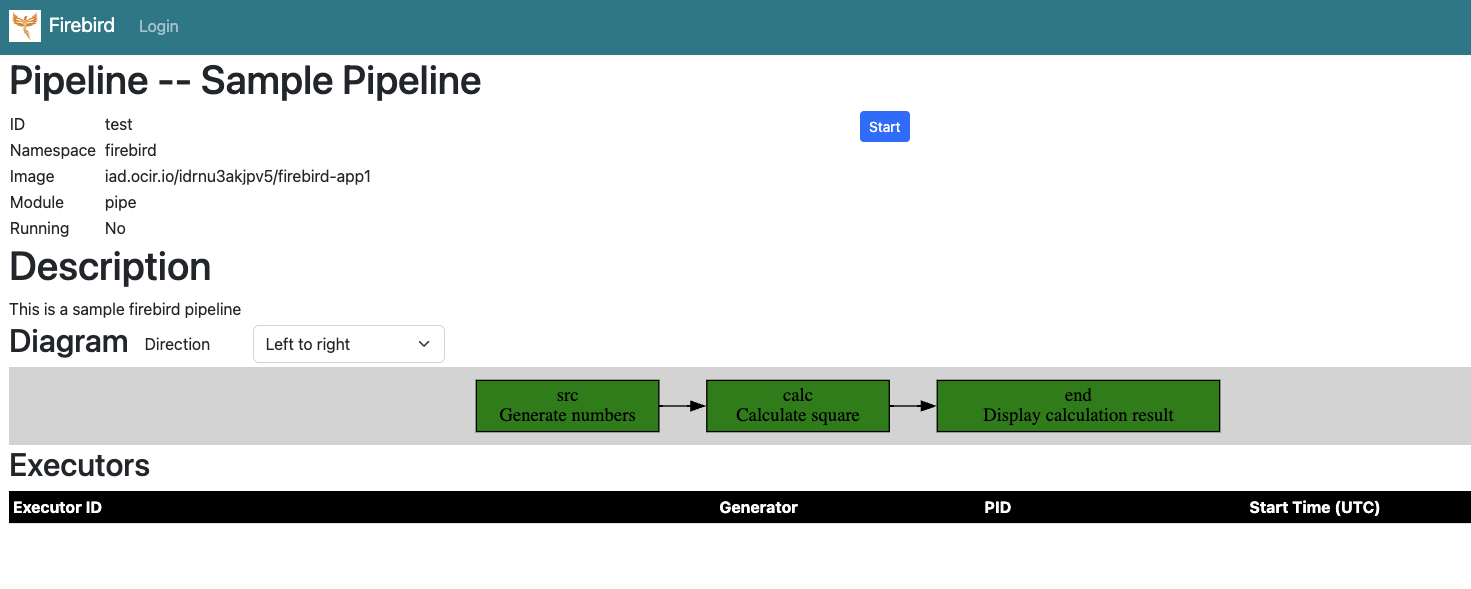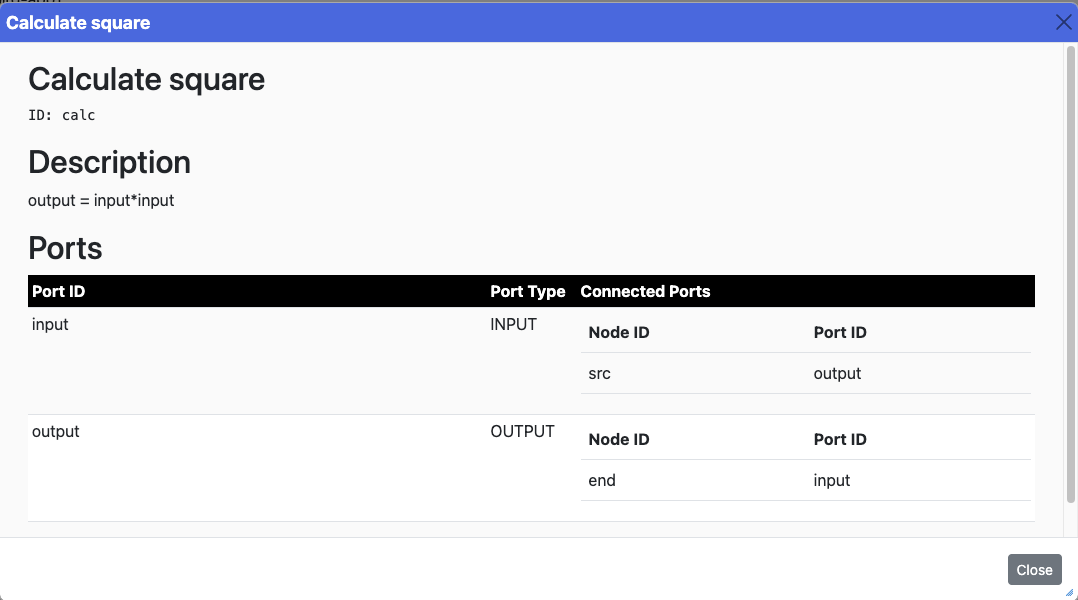Firebird/Introduction: Difference between revisions
From stonehomewiki
Jump to navigationJump to search
Stonezhong (talk | contribs) |
Stonezhong (talk | contribs) (→Beirf) |
||
| (18 intermediate revisions by the same user not shown) | |||
| Line 1: | Line 1: | ||
<p> [[Firebird]] </p> | <p> [[Firebird]] </p> | ||
= Beirf = | = Beirf = | ||
<div class="toccolours mw-collapsible mw-collapsed expandable"> | <div class="toccolours mw-collapsible mw-collapsed expandable"> | ||
<div class="mw-collapsible-preview">Brief</div> | <div class="mw-collapsible-preview">Brief</div> | ||
<div class="mw-collapsible-content"> | <div class="mw-collapsible-content"> | ||
* [https://github.com/stonezhong/firebird Source Code in Github] | |||
Firebird is a Python based Stream Processing Framework | Firebird is a Python based Stream Processing Framework | ||
* Make it easy to create streaming processing data pipeline using python | * Make it easy to create streaming processing data pipeline using python | ||
* Make it easy to deploy your pipeline to Kubernete Cluster, so your pipeline can run at scale. | * Make it easy to deploy your pipeline to Kubernete Cluster, so your pipeline can run at scale. | ||
* A Management Web UI to visualize your pipeline topology. | * A Management Web UI to visualize your pipeline topology. | ||
* The firebird framework | * The firebird framework encourages you to write reusable streaming processing unit and encapsulate it in Generator or Node or Sink. | ||
</div> | </div> | ||
</div> | </div> | ||
<p></p> | <p></p> | ||
= | = Use Python to build streaming pipeline = | ||
<div class="toccolours mw-collapsible mw-collapsed expandable"> | <div class="toccolours mw-collapsible mw-collapsed expandable"> | ||
<div class="mw-collapsible-preview"></div> | <div class="mw-collapsible-preview"></div> | ||
<div class="mw-collapsible-content"> | <div class="mw-collapsible-content"> | ||
Your python code could be as simple as below. All you need to do is, create Generates, Nodes and Sinks, and assemble them together using >> or << operator. If you have experience with Apache Airflow, you should be quite familiar with this model. | Your python code could be as simple as below. All you need to do is, create Generates, Nodes and Sinks, and assemble them together using <code>>></code> or <code><<</code> operator. If you have experience with Apache Airflow, you should be quite familiar with this model. | ||
<pre><nowiki> | <pre><nowiki> | ||
| Line 62: | Line 65: | ||
</nowiki></pre> | </nowiki></pre> | ||
</div> | |||
</div> | |||
<p></p> | |||
= Easy to deploy to Kubernete Cluster = | |||
<div class="toccolours mw-collapsible mw-collapsed expandable"> | |||
<div class="mw-collapsible-preview">Brief</div> | |||
<div class="mw-collapsible-content"> | |||
To deploy your pipeline, you can simple run the command below, you can specify parameter <code>-r</code> to specify how many pods you need to run pipeline, default is 1. Here is an example: | |||
<pre><nowiki> | |||
# it start pipeline "test", using 10 pods to run your pipeline simultaneously. | |||
/usr/src/app # pipeline start -pid test -r 10 | |||
</nowiki></pre> | |||
</div> | |||
</div> | |||
<p></p> | |||
= Web UI = | |||
<div class="toccolours mw-collapsible mw-collapsed expandable"> | |||
<div class="mw-collapsible-preview">Home Page</div> | |||
<div class="mw-collapsible-content"> | |||
Home page shows all pipelines. You can see | |||
* <code>ID</code>, each pipeline has a unique id | |||
* <code>Namespace</code>, each pipeline is deployed in a kubernete namespace | |||
* <code>Image</code>, the name of the docker image for the pipeline | |||
* <code>Module</code>, the python module name that contains the main pipeline entry. | |||
* <code>Running</code>, show if the pipeline is currently running or not. | |||
* <code>Description</code>, show the description of the pipeline. | |||
<html><img src="https://mywiki.s3.amazonaws.com/firebird-home-ui.png" width="100%"></html> | |||
</div> | |||
</div> | |||
<p></p> | |||
<div class="toccolours mw-collapsible mw-collapsed expandable"> | |||
<div class="mw-collapsible-preview">Pipeline Page</div> | |||
<div class="mw-collapsible-content"> | |||
Show the details of a given pipeline. Here is an example: | |||
* <code>ID</code>, each pipeline has a unique id | |||
* <code>Namespace</code>, each pipeline is deployed in a kubernete namespace | |||
* <code>Image</code>, the name of the docker image for the pipeline | |||
* <code>Module</code>, the python module name that contains the main pipeline entry. | |||
* <code>Running</code>, show if the pipeline is currently running or not. | |||
* <code>Description</code>, show the description of the pipeline. | |||
* <code>Diagram</code>, show the topology of the pipeline. You can click each node to see the node details. | |||
* <code>Executors</code>, if the pipeline is running, you can see the status of each executor. | |||
* You can click the "Start" button to start the pipeline | |||
* You can click the "Stop" button to stop the pipeline | |||
<html><img src="https://mywiki.s3.amazonaws.com/firebird-pipeline-ui.png"></html> | |||
<br /><br /> | |||
<h2>Node dialog box</h2> | |||
If you click a node, or a generator or a sink, you will see a node dialog box, it show the id, title and description of the node. It also shows what are the connected ports, so you know the upstream node and downstream node. | |||
<html><img src="https://mywiki.s3.amazonaws.com/firebird-pipeline-node-dialog-ui.png"></html> | |||
</div> | </div> | ||
</div> | </div> | ||
<p></p> | <p></p> | ||


